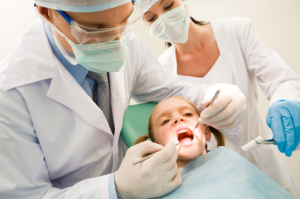Orthodontist: Education and Career Information
If you are interested in helping others with their oral healthcare, you may be successful in a career as an orthodontist. This is a specialized area of dentistry that is designed to diagnose and treat dental and facial issues such as overbites through a series of corrective methods for prevention. Orthodontists are dentists who have chosen to pursue additional education to successfully treat patients.
What does an orthodontist do?
Orthodontists work on mouth correcting malformations and misalignment that have occurred in the teeth and jaws that can make eating difficult, speaking difficult, and the items that make keeping oral hygiene difficult. The orthodontist uses a number of methods to realign the jaws and teeth, including braces, face-mask, headgear, retainers, and in serious situations, surgery. Some of the issues that are treated by an orthodontist include overcrowding, anteroposterior deviations, jaw pain, gum disease, sleep apnea and aesthetic issues. An orthodontist designs and makes specific appliances to treat patient’s teeth and jaw problems, and work with other specialists to diagnose problems. They work with dental surgeons for interventions and treatments when needed.
How much does an orthodontist earn?
The median salary for an orthodontist is around $190,000, which can fluctuate based on location, education, and experience. Private offices usually make the most money, but can make a significant income by working with other practitioners. The overall income of an orthodontist includes insurance, time off and other benefits. The job opportunities for orthodontists is projected to increase about 16% through 2022, according to the U.S. Bureau of Labor Statistics.
What skills are needed to become an orthodontist?
There are many skills needed to become an orthodontist:
Critical Thinking: An orthodontist must be able to think critically about a number of things prior to recommending certain treatments for a client. Although applying corrective methods may work for some, there are patients that have extensive issues that go beyond simple corrective methods. An orthodontist must be able to evaluate the X-rays and determine a course of action that will be successful.
Problem Solving: Many clients come to an orthodontist to solve problems that are occurring with their jaws and teeth, whether for aesthetic purposes or some other reason. The orthodontist must be able to figure out what is going on with the patient and recommend solutions that will solve critical issues such as pain and deformities.
Time Management: An orthodontist must be able to effectively manage time and coordinate projects between clients. This is a crucial component of being an effective manager.
Communication: An orthodontist must be able to communicate with clients, staff and other professionals in the care and treatment of their clients. They must be able to identify issues, research concerns and provide adequate documentation to support their findings.
Active Listening: An orthodontist must be able to listen to their patients and determine what the issues are and how to rectify them. Being able to relate to clients based on the concerns they voice is essential. There are times when clients may be allergic or reactionary to certain medicines or formulas you may use. Obtaining this information through active listening is key in being successful on the job.
Customer Service: One of the most important elements of being an orthodontist while working with clients is to have effective customer service. Clients must feel comfortable in the presence of the orthodontist and be confident in their ability to do a good job.
Attention to Detail: Because of the sensitive nature of this position, an orthodontist must be able to provide precision in their attention to detail. When working with the jaws and teeth, there is no room for error.
Management: Being able to manage staff, clients, records and administrative duties is important in maintaining order and direction in the office.
Knowledge of medicine: Knowing what types of medicines to administer and how they may affect certain clients is crucial when performing procedures. Being able to substitute one for another to protect the patient is key.
Internship Requirements
There are one to two years residency in orthodontics after the initial required internship in the dental school program.
Educational Requirements
In order to become an orthodontist, the first step is completion of a bachelor’s degree. This is needed to gain admission into dental school. Once the student has completed the bachelor’s degree, dental school will take approximately four years to complete. Coursework in the dental school program includes microbiology, anatomy and physiology. There are additional classes offered for those specializing in orthodontics, such as pediatric dentistry, dental anatomy and occlusion and dental materials. Successful completion of dental school will result in the student receiving the Doctor of Dental Science (DDS) degree.
After completion of the dental school program, individuals looking to become orthodontists must earn a professional degree in dentistry, which requires a post-degree training program. Although dentists must be licensed to practice, orthodontists must also be licensed by the state by passing the National Board Dental Examination and state clinical tests.
Orthodontists can also be certified by the American Board of Orthodontics. This assist orthodontists in showcasing their level of expertise to colleagues and patients. This exam consists of both written and clinical portions, which can only be done after completing the orthodontics residency. Certified orthodontists must recertify every ten years.
There are many reasons why becoming an orthodontist may be a good career choice to pursue. Although they perform similar duties to a dentist, their work is more specialized and is focused on providing enhanced services that will make a difference in appearance and the removal of pain. If you are looking for a lucrative career path that will allow you to assist others in improving their quality of life, this may be the position you are looking for.






